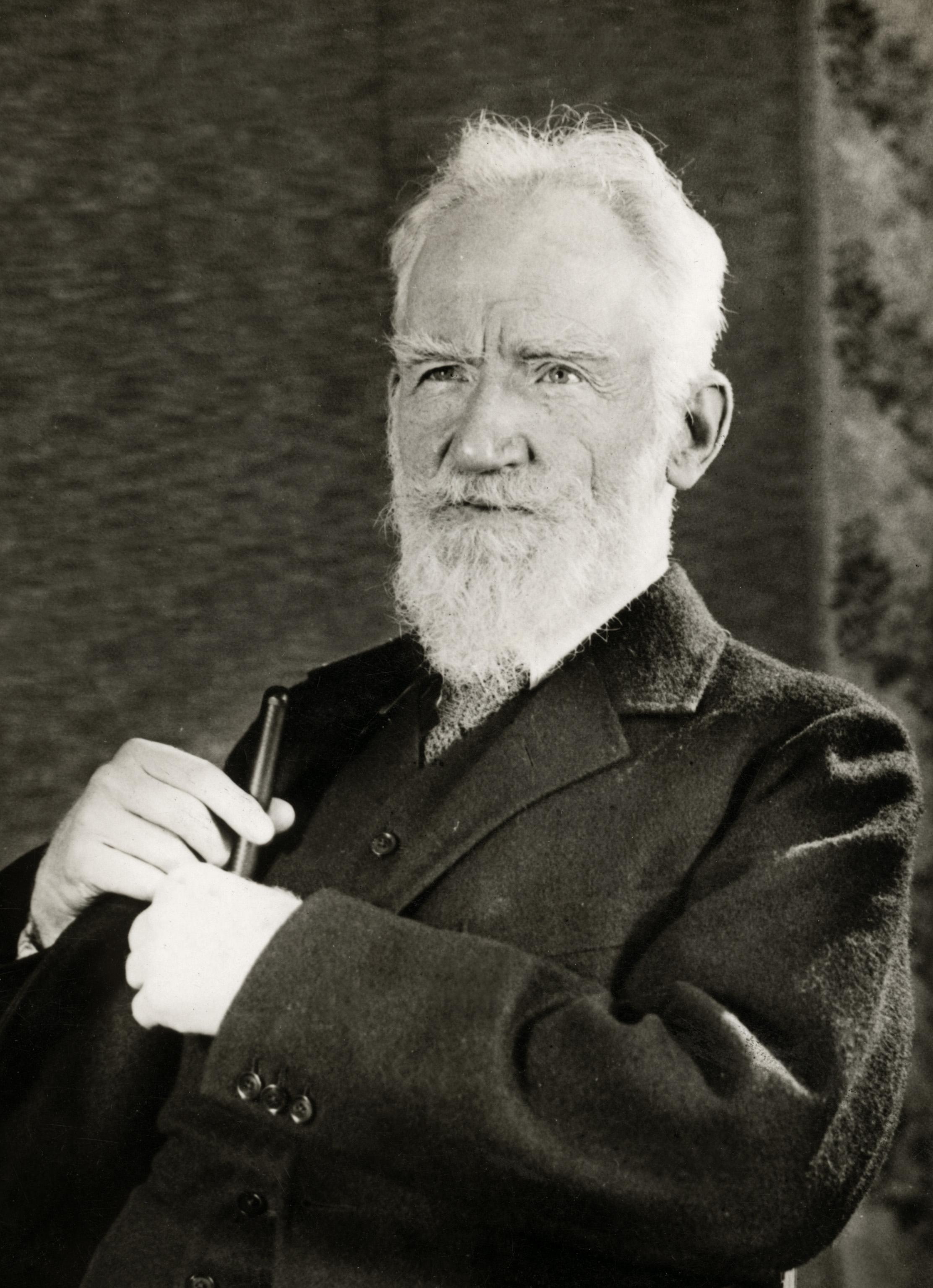George Bernard Shaw Berühmte Zitate
Zitate über Menschen von George Bernard Shaw
The Devil's Disciple, Act II (1901)
Original engl.: "The worst sin towards our fellow creatures is not to hate them, but to be indifferent to them: that's the essence of inhumanity."
„Je mehr ein Mensch sich schämt, desto anständiger ist er.“
Man and Superman (dt.: Mensch und Übermensch), 1903, 1. Akt
Original engl.: "The more things a man is ashamed of, the more respectable he is."
George Bernard Shaw Zitate und Sprüche
„Ich zitiere mich oft selber. Ich finde, es bringt Attraktivität in das Gespräch.“
The Wordsworth Dictionary of Quotations, Robertson, Connie, Wordsworth, Herfordshire 1996
Original engl.: "I often quote myself. It adds spice to my conversations."
Der Sozialismus und die Natur des Menschen, Suhrkamp, Frankfurt a. Main 1973. S. 140 ISBN 3-518-36621-1 Auswahl und Übersetzung von Ursula Michels-Wenz, zitiert in: Die Neue Gesellschaft, Heft 27, hrsg. für die Friedrich-Ebert-Stiftung, Bonn 1980. S. 757
Original engl.: "[...] Equality is the best touchstone for distinguishing your real Socialist from your virtuously indignant pitier of the poor." - The Road to Equality: Ten unpublished Lectures and Essays, 1884-1918, edited by Louis Crompton, Beacon Press, 1971. S. 194
„Wenn ich scherzen will, sage ich die Wahrheit. Das ist immer noch der größte Spaß auf Erden.“
John Bull's Other Island, Akt 2, 1907
Original engl.: "My way of joking is to tell the truth. It's the funniest joke in the World."


„England und Amerika sind zwei Länder, die durch die gemeinsame Sprache getrennt sind.“
Reader’s Digest, November 1942; für Shaw nicht belegbar, jedoch hatte Oscar Wilde schon vorher in "Das Gespenst von Canterville" einen ähnlichen Gedanken. Popular misquotes - 'the things they never said'. http://www.phrases.org.uk/quotes/misquotes/
Original engl.: "England and America are two countries divided by a common language." auch mit "United States" und "Great Britain"
Zugeschrieben

George Bernard Shaw: Zitate auf Englisch
1910s, Pygmalion (1912)
“Where equality is undisputed, so also is subordination.”
#28
1900s, Maxims for Revolutionists (1903)
Hotchkiss
1900s, Getting Married (1908)
“Political necessities sometimes turn out to be political mistakes.”
Saint Joan : A Chronicle Play In Six Scenes And An Epilogue (1923) - Full text online http://gutenberg.net.au/ebooks02/0200811h.html
1920s
What is the New Element in the Norwegian School?
1890s, Quintessence Of Ibsenism (1891; 1913)
1900s, Love Among the Artists (1900)
“The test of a man or woman's breeding is how they behave in a quarrel.”
Act IV
1890s, The Philanderer (1893)
Preface
1900s, Major Barbara (1905)
“Obedience simulates subordination as fear of the police simulates honesty.”
#88
1900s, Maxims for Revolutionists (1903)
Franklyn, in Pt. II : The Gospel of the Brothers Barnabas
1920s, Back to Methuselah (1921)
“To understand a saint, you must hear the devil's advocate; and the same is true of the artist.”
The Sanity of Art: An Exposure of the Current Nonsense about Artists being Degenerate (1908)
1900s
Lilith, in Pt. V
1920s, Back to Methuselah (1921)
Preface, Paul
1910s, Androcles and the Lion (1913)
“Your father is a fool skin deep; but you are a fool to your very marrow.”
Eve to Cain, in Pt. I, Act II
1920s, Back to Methuselah (1921)
“Consistency is the enemy of enterprise, just as symmetry is the enemy of art.”
As quoted in Bernard Shaw : The Lure of Fantasy (1991) by Michael Holroyd
1940s and later
“Chloroform has done a lot of mischief. It's enabled every fool to be a surgeon.”
1910s, The Doctor's Dilemma (1911)
“The Bible is most dangerous book ever written on earth, keep it under lock and key.”
From Why You Should Never be a Christian (1987) by Ishaq 'Kunle Sanni and Dawood Ayodele Amoo.
Misattributed
“Undershaft: My religion? Well, my dear, I am a Millionaire. That is my religion.”
Act II
1900s, Major Barbara (1905)
“My specialty is being right when other people are wrong.”
You Never Can Tell, Act IV
1890s
“No elaboration of physical or moral accomplishment can atone for the sin of parasitism.”
#116
1900s, Maxims for Revolutionists (1903)
“B: What do you think what a person I am?”
"The role of the character initiating the proposal in this anecdote has been assigned to George Bernard Shaw, Winston Churchill, Groucho Marx, Mark Twain, W. C. Fields, Bertrand Russell, H.G. Wells, Woodrow Wilson and others. However, the earliest example of this basic story found by QI did not spotlight any of the persons just listed [...]
[...] QI hypothesizes that this anecdote began as a fictional tale that was intended to be humorous with an edge of antagonism. The story was retold for decades. Famous men were substituted into the role of the individual making the proposition. Occasionally, the individual who received the proposition was also described as famous, but typically she remained unidentified.
[...] In January 1937 the syndicated newspaper columnist O. O. McIntyre printed a version of the anecdote that he says was sent to him as a newspaper clipping. This tale featured a powerful Canadian-British media magnate and politician named Max Aitken who was also referred to as Lord Beaverbrook [MJLB]":
Someone sends me a clipping from Columnist Lyons with this honey:
“They are telling this of Lord Beaverbrook and a visiting Yankee actress. In a game of hypothetical questions, Beaverbrook asked the lady: ‘Would you live with a stranger if he paid you one million pounds?’ She said she would. ‘And if be paid you five pounds?’ The irate lady fumed: ‘Five pounds. What do you think I am?’ Beaverbrook replied: ‘We’ve already established that. Now we are trying to determine the degree.”
Quote investigator http://quoteinvestigator.com/2012/03/07/haggling/ cited 2013-07-10
Misattributed
